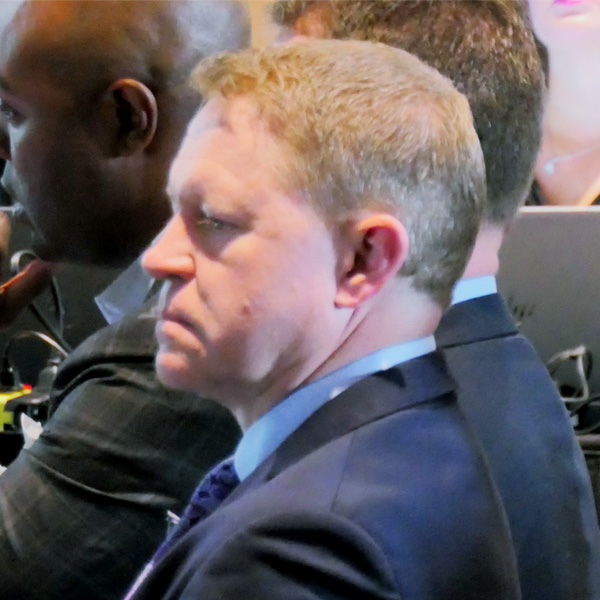MINNEAPOLIS — Amid the Independent Market Monitor’s denunciation of MISO’s fleet assumptions for long-term transmission plans, MISO lead planners last week defended their approach to planning for 2040.
Stakeholders, meanwhile, continued to debate whether it’s proper for IMM David Patton to deviate from markets to weigh in on MISO transmission planning.
MISO Vice President of System Planning Aubrey Johnson said MISO is seeking an “optimal, cost-effective expansion” in its second, multibillion-dollar long-range transmission plan (LRTP) portfolio that can hold up under several hypothetical circumstances.
That comes two weeks after Patton repeated criticisms of MISO’s future fleet assumptions behind its second LRTP portfolio. The IMM has alleged MISO is overestimating renewable additions and baseload generation retirements while underestimating future battery storage. He has said a transmission overbuild stands to harm market functions. (See Market Monitor Questions MISO Fleet Assumptions in Long-term Tx Planning.)
“We are not the resource planners,” Johnson told board members at a Sept. 12 System Planning Committee of the MISO Board of Directors meeting. “But what we do is take these plans and goals from our members and make a path that shows how they can be accomplished.”
Johnson said MISO “has not seen any indication” that members’ plans have changed. It remains that 70% of MISO load is associated with members’ decarbonization commitments, he said.
MISO hasn’t yet recommended any transmission projects under the second LRTP portfolio. That’s set to happen next year.
“This whole process has tension in it,” Johnson said, referring to “standing-room-only” stakeholder workshops full of members with differing views on generation and transmission expansion. He promised that MISO will run several analyses and stress tests against multiple planning scenarios and the IMM’s idea of the resource mix before recommending lines.
“We recognize that the portfolio we recommend, the state commissioners today might not be the commissioners that approve those projects,” Johnson said.
Some stakeholders said the IMM’s opinions on MISO’s future fleet deserves research.
Alliant Energy’s Mitch Myhre asked MISO to take the time to perform a sensitivity analysis that includes the IMM’s view of the future and “arrive at a set of projects that have good business cases.”
North Dakota Commissioner Julie Fedorchak said the expected second LRTP portfolio price tag at $20 billion to $30 billion warrants careful examination. She also said North Dakota supports MISO taking a deeper look at its battery storage projections.
“We are talking about extreme amounts of money, and that’s not even taking into account the generation, that will be borne entirely by ratepayers,” she said.
WEC Energy Group’s Chris Plante said while the first $10 billion LRTP portfolio was “low-hanging fruit” of known choke points on the system, the second LRTP portfolio is a more drastic investment.
But some MISO members took to the Sept. 12 Markets Committee of the Board of Directors to condemn Patton’s disapproval of MISO’s planning assumptions.
ITC’s Brian Drumm said the IMM has “repeatedly invoked the authority of his office in an attempt to force MISO and its stakeholders to implement one person’s vision for MISO’s energy future.”
“The IMM’s attempt to influence LRTP tranche two regional transmission planning is neither necessary, impartial, effective, market monitoring [nor] within the scope of the plan,” Drumm said.
Drumm said Patton’s “out-of-scope intervention” in LRTP planning is “disruptive.” He asked that MISO’s board intervene and prevent the IMM from attempting to undermine MISO’s fleet assumptions that “economically incorporate the letter and the spirit of the decarbonization and renewable energy goals of MISO’s members and states.”
Other stakeholders characterized the IMM’s recent involvement in the fleet assumptions underpinning the LRTP as an 11th-hour attempt at circumventing MISO’s second portfolio of long-term transmission planning.
Clean Grid Alliance’s Beth Soholt said she believed MISO and members are adequately capturing the most likely range of future fleet mix possibilities.
“We need a grid that can support all this uncertainty and all of these changes,” she said.
Soholt added that Patton’s inappropriate foray into transmission planning comes as MISO is reupping the IMM’s annual contract. She advised MISO not to expand monitoring duties to include planning.
Patton did not respond to RTO Insider’s request for comment on the divide. He did not respond in real time during the Markets Committee.



